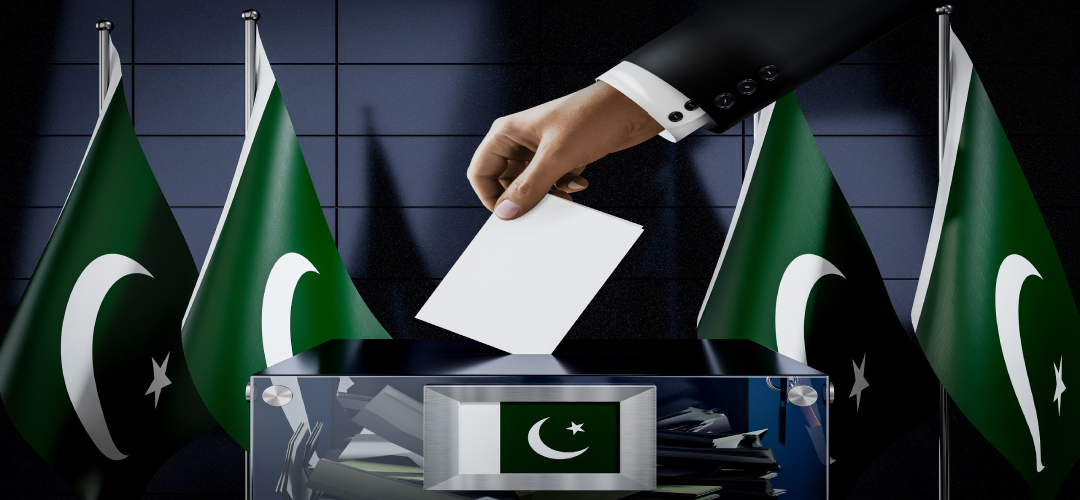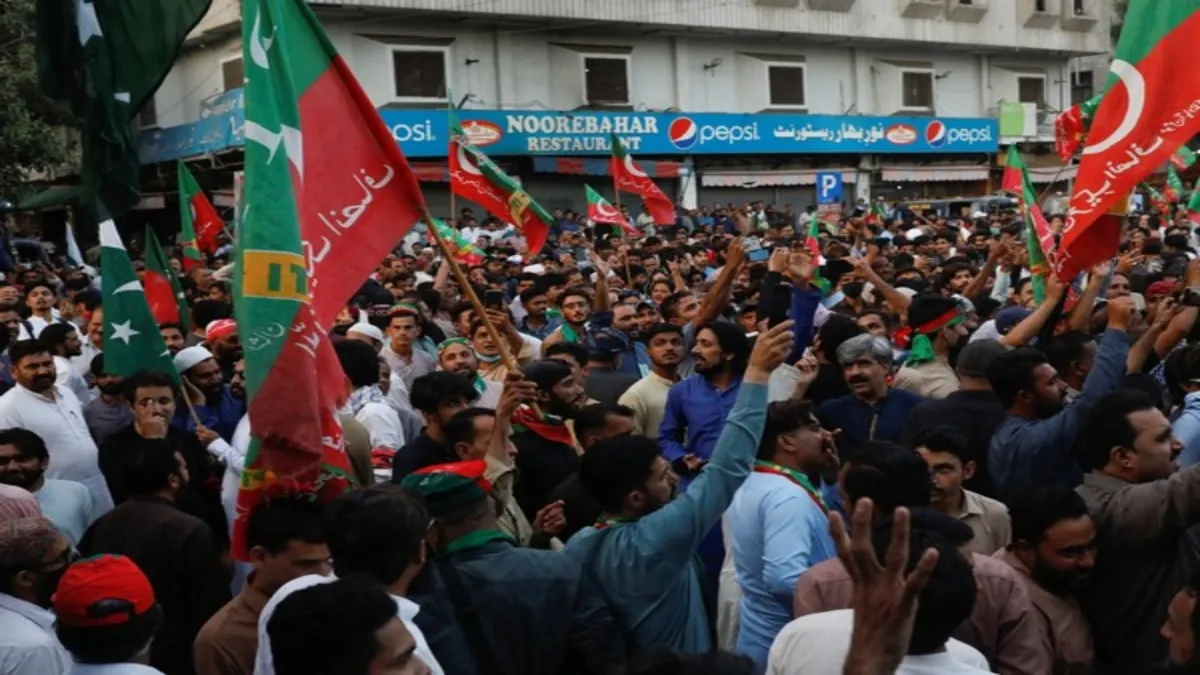Pakistan Elections: Free and Fair?
December 30, 2023 | Expert Insights

The domestic political scene in Pakistan remains chaotic. While Imran Khan, rated as the most popular political personality, remains incarcerated, embroiled in hundreds of legal cases, and his party 'electable' are either in hiding or having publicly resigned after a spell of 'software update' in prison, only Nawaz Sharif's PMLN seems to be enjoying the favour of the all-powerful military. After remaining a proclaimed absconder for four years in his luxurious London dwellings, Nawaz Sharif was warmly welcomed back home, and all his legal cases were overnight dispensed with as if with magic. By all counts, his re-election has already received the military's blessing, and only the formality of an electoral process has to be undergone.
But the only elephant in the room is Imran Khan, who, unlike other politicians in the past, refuses to flee into a comfortable exile abroad or come to an understanding with Gen General Syed Asim Munir Ahmed. The General lost no time catapulting himself as the arbitrator of everything important in Pakistan. But then, this has been the norm in Pakistan for the last seven decades.
It is unlikely that Imran Khan will be allowed to contest the elections as, due to his conviction in the Tosha Khana corruption case, he is not eligible to hold any public office. His political party, the Pakistan Tehreek-e-Insaaf, has not been officially banned. However, the Election Commission of Pakistan (ECP) has left no stone unturned to marginalise it, including trying to take away its election symbol of a cricket bat.
The third major party, Pakistan’s People’s Party (PPP), is also struggling as it is not receiving the kind of support from the military that could give it an edge. To make matters worse, Bilawal Bhutto, the heir apparent, and his father, Mr Zardari, have been publicly voicing their differences.
Background
Free and fair elections in Pakistan have remained a chimaera. Any pretence of democracy is put to paid by the military which remains the puppet master pulling the strings before, during and after ever elections. This time, it is no different.
Last year, when Gen Bajwa reluctantly remitted office after having denied yet another extension, he confessed to the unconstitutional political meddling of the 'establishment'. He promised to leave behind a legacy of non-interference of the military in politics. His promise did not endure for very long.
Imran Khan was a creation of the military, an answer to the military’s perennial problem of how to have power without responsibility. PTI was brought to power in 2018 in what came to be known as the 'hybrid regime', with the GHQ holding the real power behind the throne. The military's protegee has clearly gone rogue and is now their biggest enemy. Unfortunately, he is also the only political personality in the country with the largest following, especially amongst the young and social-media savvy. Despite immense pressure, Imran Khan has refused to buckle down. On the other hand, Nawaz Sharif's PMLN is the one that has gone to the military's camp. The fear of the return of Imran Khan to power has brought these disparate forces together.

Analysis
The very fact that the ECP took its own time to announce the election schedule (which it very reluctantly did when forced by the Supreme Court to do so) should make it quite clear how free and fair the elections would be. If the Supreme Court had not intervened in favour of the elections (which have already surpassed the constitutionally mandated deadline by several months), there were clear indications that the caretaker government, hand-picked by GHQ, would continue indefinitely until the economic and political turmoil had somewhat settled and the ghost of Imran Khan laid to rest. Even now, the way things work in Pakistan, there is no certainty that elections will not be postponed or deferred indefinitely if the Pak Army feels threatened by them.
The stakes in this exercise are too high for all the parties involved. They do not want to make any mistakes, and constitutional statutes are of little concern. After all, a military dictator is on record saying that the Constitution was ‘just a piece of paper’ that they could tear up at any time.
Institutional impartiality and independence have never been the hallmark of the bureaucratic structure of Pakistan. The country is a flawed democracy, with those with the power wielding it with impunity. Just holding elections every five years is not a barometer of democracy; how those elections are held and under what conditions also matters.
The Pakistani Army has never trusted the Sharifs. It has a long history of antagonism with the elder Sharif brother Nawaz. This is despite the fact that he, too, was once created as a puppet of the men in uniform. The fear was always there of a possibility that the Sharif brothers could strike some kind of backend deal with Imran Khan. Hence, to hedge its bets, the deep state appointed a caretaker government under a pliant individual who would completely do its bidding, Anwaarul Haq Kakar.
This has solved one problem for the Pakistan Army. But there are other ways in which election outcomes can yield unwanted results. If the ballots are not properly monitored, then things could go awry. Also, if the proper candidates are not screened, some upset victory may take place somewhere that might topple the apple cart.
Here the importance of the election commission of Pakistan has become self-evident for the army. The final results will be announced by the election commission. The ballots will be counted by officials from the election commission. Polling booths and voter registration will also be under the control of the same.
All this has meant that the election commission has to be under the complete control of the security establishment. And this is what has happened. The commission has been filled throughout its ranks with yes men who are total political appointees. They depend for their livelihood on the good graces of the deep state.
In this context, the election commission has proved its loyalty. Its first order of business was preventing Imran Khan from holding any political office even if he wins the elections from jail. It has succeeded in this endeavour. The remaining issue was weeding out Imran Khan loyalists from the PTI by disqualifying them. This has also turned out to be a successful operation.
The other major institution in Pakistan that has been a thorn in the side of the military time and time again is the judiciary. Despite the army’s dominance, the justice system has tried to maintain a level of independence throughout the history of Pakistan. This has not been easy. The judiciary revolves around the Chief Justice of the Supreme Court of Pakistan. The current chief justice could play a critical role in the upcoming elections. If the final results turn out to be unreliable, then it could officially declare that the national elections have been rigged and call for fresh elections.
A conflict between the judiciary and the army will not bode well for Pakistan. Political instability extracts a huge price. The economy has been hit hard and is still reeling from the impact. The country desperately needs foreign loans and investments, which will remain elusive in case of political instability.
The common people of Pakistan need political and economic stability now more than ever. They are tired of being subject to the antics of the political and military class. But do they matter when everything can be tinged with the colour of national security by the military establishment? Imran Khan was banking on mass mobilisation in his bid to take on the Army but after May 9th, the powerful show of force has cowed down public support.
Obviously, New Delhi would be closely monitoring the situation. It is irrelevant for Indo-Pak relations which political party comes to power- the Indian policy is entirely the domain of the Pak Army. The choices are stark for the Indian government. Whichever party comes to power will be a hard nut to crack for the Indian foreign policy and defence establishment.
However, before the May 9th crackdown, public pressure had put the military establishment on a back foot, and Imran Khan seemed to be holding all the cards. Since then, the situation has turned back in favour of the military. But a convincing win for PTI, even without Imran Khan contesting, would put the military on a spot. This is a situation that Gen Hafiz Munir is not likely to permit to develop at any cost. We have to wait and watch to see how the drama unfolds.
Assessment
- These elections could turn out to be a turning point for Pakistan. The military-security complex in the country is, for the first time, in a tight spot, and engineering the outcome of the elections in its favour will take some doing.
- The status quo has failed in Pakistan. A radical overhaul is needed. But Imran Khan’s blatant, crude populism might not be the way to achieve this. Even if he wins, his party has no concrete plan to put the country on the path to recovery.
- Political instability in Pakistan is never good news for India. India must support the new dispensation that comes to power if it is elected democratically, thus weakening the stranglehold of the military on Pakistan's politics.








Comments